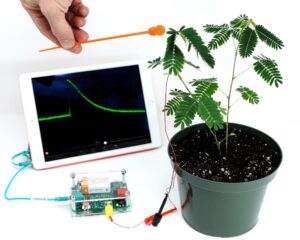Ongoing Research
Let’s fight back: Harnessing Nature's Arsenal Against Mosquitoes
In the modern world, infectious diseases claim over 700,000 lives annually, posing a grave threat to global health. Mosquitoes, as hematophagous vectors, play a significant role in the transmission of these diseases. This impact is especially pronounced in developing countries like Sri Lanka, where health improvements and development remain limited. Our groundbreaking research aims to confront this challenge head-on, tapping into the abundant yet overlooked plant resources of Sri Lanka’s North Central province. By harnessing these natural wonders, we strive to create a revolutionary polyherbal ointment that surpasses the repellent capabilities of harmful synthetic alternatives currently dominating the market. Our vision extends far beyond mere mosquito protection. We seek to pioneer safe and highly effective natural mosquito repellents capable of curbing the spread of infectious diseases, ultimately saving countless lives, where science meets nature to shape a healthier and more resilient future.

Evaluating medicinal plants for anti-cancer effects
Natural products hold a significant role in anticancer therapy. Some of the currently used anticancer drugs in the clinic are of natural origin. Currently Sri Lankan medicinal plants are tested for their anti-cancer effects in our laboratory. Further, many of the traditional medicine formulae used are not thoroughly scientifically validated. Therefore, these formulae are also tested for their in vitro anti-cancer effects.
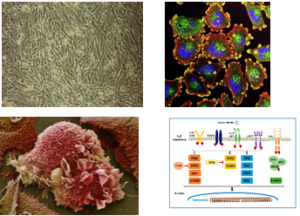
Development of dietary supplements for various diseases
Dietary supplements are widely used to improve health. These products are available in many forms such as capsules, chewable preparations and powders and they may contain an individual herb or a combination of herbs. In our laboratory we develop and test the bioactivity of these supplements.

Development of porous polymer-based filter materials for the removal of heavy metals in contaminated water
Ecological life is impacted by heavy metals due to contamination through bioaccumulation and biomagnification. The excessive discharge of heavy metals into the environment has had a substantial negative impact on water supplies due to the fast industrialization and urbanization occurring around the world. Heavy metals are particularly dangerous due to their high toxicity, carcinogenicity, and non-biodegradability. This research is focused on the effective use of feasible mechanisms for the selective removal of heavy metals from contaminated water utilizing porous materials. Metal-Organic Frameworks (MOFs) are a class of crystalline porous polymers composed of metal clusters and organic ligands linked through coordinate bonds. In this study, different MOF-biopolymer composites are prepared to target the effective removal of heavy metals from contaminated water. The expected outcome of this research is to develop commercially viable, cost-effective, reusable, filter material, which could produce safe drinking water by reducing the heavy metal contaminants to WHO-permitted levels.
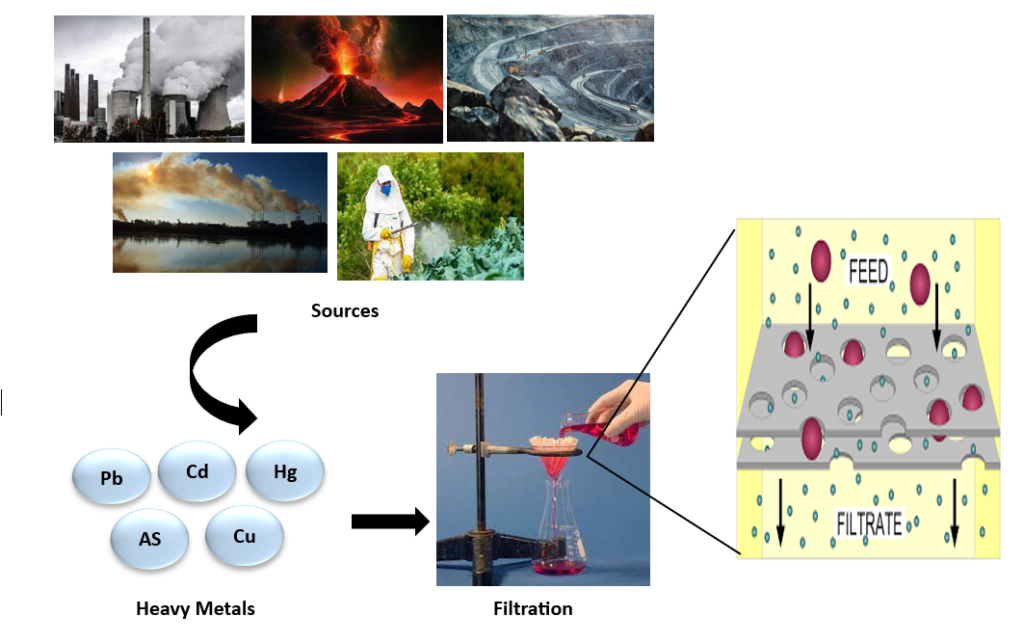
Searching for the untapped potential of underutilized fruits in Sri Lanka
Underutilized fruits in Sri Lanka have been in a great deal of demand to utilize sustainably. It is observed that knowledge of the medicinal value and nutraceutical properties of Sri Lankan wild fruits is either lacking or poorly being disseminated within the community. Therefore, identifying health-promoting aspects of some underutilized fruits while screening their medicinal properties will be considered in this study. In order to do that, priority will be given to evaluating the pharmacological activity of some selected Sri Lankan wild fruits, especially focusing on edible parts and seeds. Thus, screening bioactivities e.g., antioxidant, anti-diabetic, and anticancer activity of some selected wild fruit/s and their parts will be carried out according to research protocols and procedures. Consequently, the best candidate will be chosen for in vitro, in vivo, toxicity, and clinical assessment in order to confirm the potency and attempts will be made to formulate a nutraceutical product that could have gained value addition, health-promoting, and well-being. Therefore, at the same time, our next goal would be disseminating the findings of new knowledge and technological know-how of the applications to the public.

Bioprospecting functional metabolites from Sri Lankan macroalgae
Investigation of marine macroalgae in Sri Lanka has identified a potent brown alga, Chnoospora minima as one of the most important and promising sources for bioactivities. Although, past studies have been focused on several biological activities on C. minima, in vitro anticancer effects using multiple in vitro mechanisms are yet to be investigated. Therefore, a prime goal of this study is to investigate the antiproliferative activity of C. minima in depth. In addition, C. minima have been shown to possess low toxicity and therefore can be used for extraction of bioactive compounds for application in possible functional food, nutraceuticals, and pharmaceutical products.
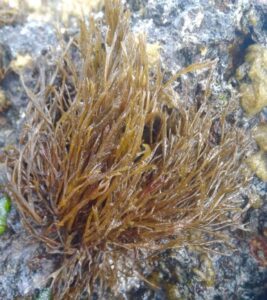
Developing methods for graphene/derivative synthesis
This project focuses on developing electrochemical methods for graphene and graphene derivative synthesis. The aim is to develop methods feasible for Sri Lanka.

Developing 2D Materials for energy applications such as supercapacitors and batteries
Important 2D materials such as graphene, graphene derivatives/composites, and titanate are developed to improve the electrochemical performance of the materials that are used in energy devices such as batteries and supercapacitors.

Quantifying corrosion and developing anti-corrosion materials
Corrosion is a destructive process and in many instances it is important to quantify it. Corrosion quantification experiments are carried out. This is also done to test the performance of the novel anti-corrosion coatings/materials developed.

https://www.etc-expo.com/prevention-of-corrosion-of-metals /
Developing materials for electrocatalysis and/or sensors
This project focuses on developing materials to catalyze the industrially important sluggish electrochemical reactions.
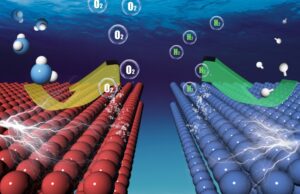
https://iopscience.iop.org/journal/0957-4484/page/Focus-on-Nanoscale-Electrocatalysts
Studying plant electrophysiology
This project focuses on studying how the electrophysiology of plant is changing upon stresses and stimuli. By understanding plant electrophysiology most suited conditions can be provided for the plant to get the maximum benefit and would be useful to develop sensors.
Melioidosis Research
Comparative study on the Molecular detection of Burkholderia pseudomallei, a causative agent of potentially fatal infectious disease Melioidosis, in contaminated soils using fluorescent dye-based Real-Time PCR assays
(in collaboration with Dr. Dharshan De Silva, Senior Lecturer/Head, BML-2, Faculty of Medicine, KDU, Prof. Enoka Corea, Department of Immunology and Microbiology, Faculty of Medicine, University of Colombo)
Bioremediation – Our research focuses on development of indigenous microbial consortia to break down pollutants such as petroleum hydrocarbons, pesticides, and other xenobiotic compounds in the environment. These microbial processes contribute to environmental cleanup and sustainable waste management. We have developed a metabolically efficient microbial consortium for petroleum hydrocarbon and xenobiotic degradation in both aquatic and terrestrial environments. This approach leverages microbial biosurfactant-mediated degradation and utilizes an indigenous consortium isolated from marine environments.
Biofertilizers – We develop microbial biofertilizers using beneficial fungi such as Trichoderma, mycorrhizal fungi, and plant endophytes. These enhance soil fertility, improve plant growth, and reduce reliance on chemical fertilizers, promoting sustainable agriculture.
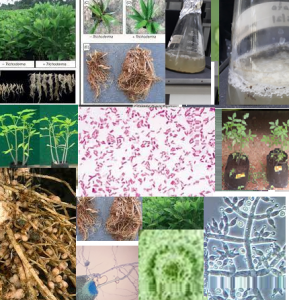
Microbial & Enzyme Degradation of Synthetic Plastics –Biodegradation of Petroleum-Based Synthetic Plastics
Globally, 31.9 million metric tons of plastic waste accumulate annually, with 1.59 million metric tons in Sri Lanka alone—much of it reaching the ocean. The widespread release of microplastics contaminates marine ecosystems, posing risks to wildlife and human health through ingestion.

We focus on identifying and characterizing indigenous microbial strains and depolymerases capable of breaking down petroleum-derived synthetic plastics. These microbes and enzymes are explored for bio-augmentation and bio-stimulation strategies to enhance the bioremediation of plastic-polluted environments.
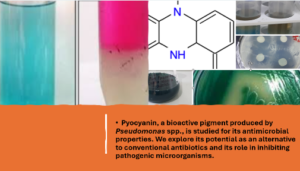 Microbial Secondary Metabolites – We investigate the production of high-value microbial metabolites such as biosurfactants and pyocyanin for industrial, pharmaceutical, and environmental applications. Currently, our lab focuses on the production of biosurfactants using waste coconut oil as a sustainable raw material. These biosurfactants have potential applications in bioremediation, detergents, and pharmaceutical formulations.
Microbial Secondary Metabolites – We investigate the production of high-value microbial metabolites such as biosurfactants and pyocyanin for industrial, pharmaceutical, and environmental applications. Currently, our lab focuses on the production of biosurfactants using waste coconut oil as a sustainable raw material. These biosurfactants have potential applications in bioremediation, detergents, and pharmaceutical formulations.
Pyocyanin, a bioactive pigment produced by Pseudomonas spp., is studied for its antimicrobial properties. We explore its potential as an alternative to conventional antibiotics and its role in inhibiting pathogenic microorganisms.

